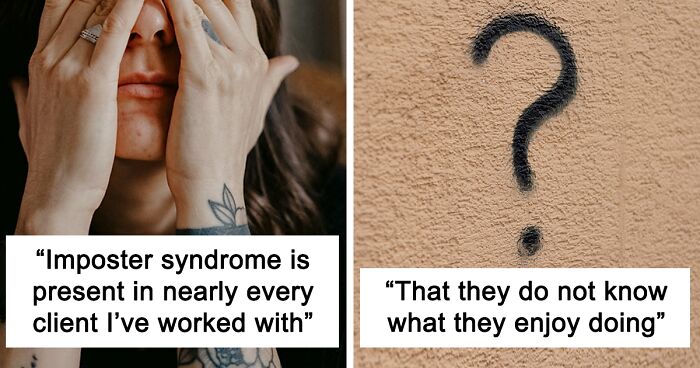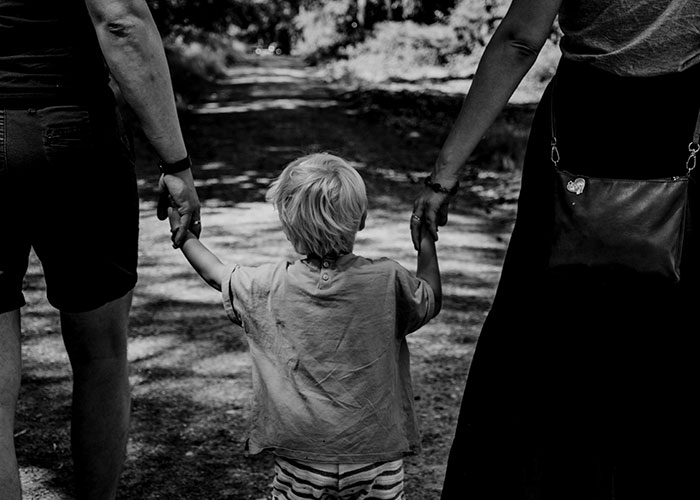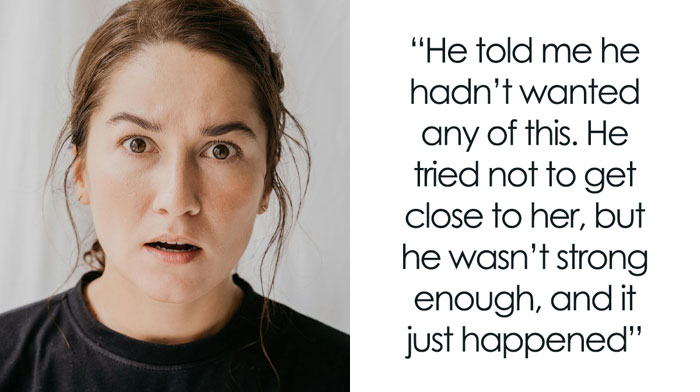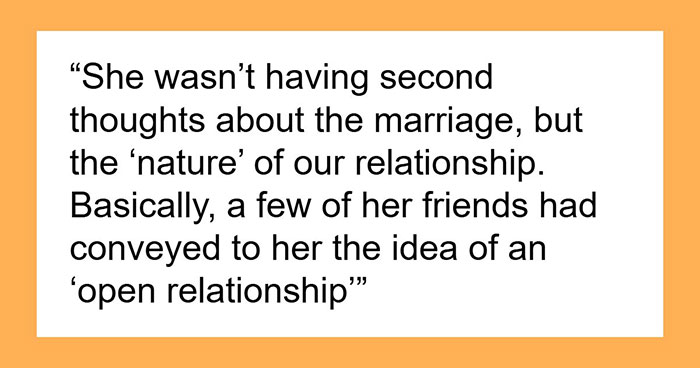
Therapists Reveal 30 Things People Are Often Embarrassed To Tell Them But That They Actually Hear A Lot Of
InterviewAccording to Lori Gottlieb, who is a psychotherapist based in Los Angeles, the author of Maybe You Should Talk to Someone, and co-host of the podcast Dear Therapists, it's very common for people to struggle with fully opening up to their therapist and hide things from them at one point or another.
There are many reasons why we stay silent. Sometimes we worry that the information will make the therapist view us in a negative light, but we also might find the issue embarrassing, or just be stuck in denial.
To find out more about the topics that we keep to ourselves, Redditor u/Music-and-wine made a post on the platform, asking: "Therapists, what is something people are afraid to tell you because they think it's weird, but that you've actually heard a lot of times before?" And the replies they received provide an interesting insight into what usually stays behind closed doors.

This post may include affiliate links.
 Two topics come up with regularity: when someone discloses to me that they were sexually abused as a kid, and/or when some is experiencing suicidal ideation. Both are something I hear from clients every single day, and so I don’t find it weird at all. But, when I have someone in front of me who’s talking about it for the first time, I know it’s important to validate the fact that even though I might be talking about this for like the fifth time that day, they have never talked about this EVER, and are in need of gentle care to feel safe.
Two topics come up with regularity: when someone discloses to me that they were sexually abused as a kid, and/or when some is experiencing suicidal ideation. Both are something I hear from clients every single day, and so I don’t find it weird at all. But, when I have someone in front of me who’s talking about it for the first time, I know it’s important to validate the fact that even though I might be talking about this for like the fifth time that day, they have never talked about this EVER, and are in need of gentle care to feel safe.
Many victims of abuse (menal, physical, sexual) blame themselves and/or are threatened they will be killed ect if they should ever tell anybody
My abuser had been dead for years before I dared talking about it. I had myself convinced that I overreacted, that nobody would believe me, that it would destroy my relationship with my family. Didn't need a physical threat, that was more than enough. I can't describe how it felt to say it out loud and be validated, can't thank the medical health professionals enough.
Load More Replies...Several people I've known throughout my life said they feared bring up suicidal ideations because they were worried they'd be involuntarily committed to a psych institution immediately.
Yes. A couple of decades ago, I disclosed to my GP that I was having some suicidal thoughts. I was sent to the ER where I sat around for twelve hours waiting for a psyche consult that never really happened. A psychiatrist did contact my insurance to find out what they would cover. After spending a long time on the phone with them, she came to me and said "They want to know what it would take to make you not suicidal" (her exact words). I'm thinking are they trying to buy me off? It was such a weird question. I asked what that meant and the Dr just shrugged. After all of that, nothing happened. I was discharged and went home.
Load More Replies...Clinical psychologist Dr. Jennifer Cain told Bored Panda that talking to a therapist you've just met is like emotionally undressing in front of someone you don't know. "It's natural to feel nervous at first," Dr. Cain said. "But it gets easier to share as you feel more comfortable with your therapist. It is okay to let the process unfold naturally, at a pace that is comfortable for you."
The psychologist highlighted that it's very helpful to keep in mind that the therapist is there to help you. However, "if there is something you don't want to share, it's okay to tell your therapist that you're not comfortable sharing about that yet," she added.
"If you are not sure whether you should share more about something, one thing you can do is ask your therapist if it would be helpful to give more details about it."
 I'd say a common one is believing that there's something innately, irreparably wrong with them that makes them unable to ever truly 'fit in'. For a lot of people it's such a deeply ingrained belief that it can be extremely painful to acknowledge or express, regardless of the level of personal success in their lives.
I'd say a common one is believing that there's something innately, irreparably wrong with them that makes them unable to ever truly 'fit in'. For a lot of people it's such a deeply ingrained belief that it can be extremely painful to acknowledge or express, regardless of the level of personal success in their lives.
Some characteristics are built based on horrible experiences. For me it's being left to my own devices at a young age. I need to be creative to stay alive. That made me resourceful and that contributed a lot to how well I did in life. But that doesn't mean it did not hurt. In fact it's because it hurt so bad I have to see things differently to stay sane.
People who've grown up in chaotic and toxic households where caregivers tend to get angry very fast at the slightest mistakes and nitpick kids on their shortcomings usually do grow up to think they're something wrong with them. When you constantly hear statements from the time you were a kid such as 'why are you like that?, 'why can't you be like everyone else?' Or 'I wish you weren't so difficult to be around', we do internalize that lack of self worth because children trust their parents in a way that defines their perception of the world and their place in it. Children learn to love and experience love for the first time from their parents and to have your worth diminished by them leads to a lifetime of self doubt and lack of self worth. People aren't born not believing in themselves.
I learned at a very young age that my happiness does not depend on what other people think of me. If you don't like me I really don't care.
All my life I have never "fit in" even my own family, does it really matter? Why must something be wrong ? This is the bit that confuses me, if I do not fit them the group is wrong for me. I have just never found one that is right, we do not really try though.
Load More Replies...And then there are those of us who are non- neurotypical. Never could figure out why I was so different until I got diagnosed with autism in my 40's. I'm actually fine socially but a lot of how society and culture function kind of always felt weird to me. After connecting with other ASD people online, especially other women, i found out a lot of the same things are weird for them too. The diagnosis made me understand why I spent a lot of my youth feeling like I was an alien.
I'm non-neurotypical too, and I've felt this way all my life. Not sure if I'm autistic or not, never sought diagnosis or anything, but I've always felt like I'm some sort of strange creature and there's no one else like this. I've come to terms with it by now and I'm fine being the only one of my kind. It's lonely, yes, but I've never known any other way to be. I don't really fit in with the autistic community either. Just a strange beast all by myself.
Load More Replies...You're making it sound like some dysfunctional belief system that can simply be lifted off the patient's psyche. Think of the highly gifted person: his peers call him a nerd, his teachers find him disruptive because he,s always asking THE question that points to the elephant in the room, and his parents ''jokingly'' tell him that they found him while on vacation to an exotic place that can't be found on any map. But the patient is the one who has all these erroneous beliefs, and he needs fixing, real quick. What's wrong with this picture?
Actually gifted people being bullied by their peers and parents is not a universal reality, but a cultural staple of the US. Bullying smart people isn't normality.
Load More Replies...The not-fitting-in, I can admit to ... also that there are things about me that may have use for some progress ... but, I don't think neither I nor any other misfit is somehow less of whatever because of not fitting in - just look at what you're supposed to be fitting in. A society full of phonies, people lovingly contribute to their own and their fellow beings' exploitery, but fighting against, say, FFF, irresponsible actions whereever you look, but if you do things that are seen as irresponsible (which often ist exaggerated), you are a lot less of a human, according to the majority ... Not fitting in does by no means mean any of that.
I feel this a lot and my therapist said nothing is broken and that I can heal. I almost felt insulted because EXCUSE ME SIR I NEED TO PITY MYSELF. Gosh, do I hope that I will stop being such a f*****g wimp
 Imposter syndrome is present in nearly every client I've worked with (hundreds over the years), and it sometimes is hard for people to recon with that they feel incompetent in work or life. It is super common to feel like everyone else has it figured out, and that you are the only one flailing. The biggest thing that I've learned in transitioning to adulthood and in getting an in depth look into so many people's lives, is that we are all just trying to figure it out, and a lot of energy goes into trying to make it look like we know what we are doing and fear of being found out.
Imposter syndrome is present in nearly every client I've worked with (hundreds over the years), and it sometimes is hard for people to recon with that they feel incompetent in work or life. It is super common to feel like everyone else has it figured out, and that you are the only one flailing. The biggest thing that I've learned in transitioning to adulthood and in getting an in depth look into so many people's lives, is that we are all just trying to figure it out, and a lot of energy goes into trying to make it look like we know what we are doing and fear of being found out.
When I was a kid my aunt taught me that nobody really knows what they are doing, not really, she said "there's no Dr. Spock manual for grown ups!"
Turn 45 this year. Wish I would have accepted this in my twenties. Now I’m happy to successfully flail thru life. :)
Hey at least you successfully fail. ❤️ It's also a achievement.
Load More Replies...I had the opposite. Quoting from, I think, the film ‘The agony and the ecstasy’, I constantly thought ‘Why am I surrounded by idiots?’
I recently realized that there is no guidebook or rulebook to life. First I thought it was hard not knowing what to do or how to be in life. Then i realized that there is no guidebook, in other words anything I do can't be wrong as there are no instructions. quite liberating.
Oh yes. I’m retired now, but I was (still am) embarrassed to tell people how much money I made. (Yes, they do ask.) It wasn’t a fortune but it was a lot more than a high school education should have earned.
I read this comment somewhere and use it my computer wallpaper cause I think it's very warm and encouraging >> "We're all trying to figure it out, at any age. Don't let anyone tell you otherwise."
Reddit user DnDYetti, one of the mental health professionals whose reply you can find on this list, agrees that there may be a big variety of reasons why a client holds back information from their therapist.
"I can't realistically touch upon them all, however, I feel that the most common reason is the fact that the client is engaging in a brand new environment with someone whom they have only just met. Thus, that fear of judgment is likely front and center in their mind until they get to know their therapist better and get the opportunity to build up a therapeutic alliance," DnDYetti told Bored Panda. "This is especially true for individuals who have had a long history of perceived judgmental interactions within their life. This connects highly to what is known as an individual's 'learning history.'"
"Simply put, what an individual has experienced in their daily life will be ingrained into their understanding over time and impacts their behavior (positively or negatively). If an individual has consistently experienced judgmental people and has had a long history of distrust with those around them, then they are highly likely to be defensive and fearful of opening up to others in the future. Every therapy experience holds so many unforeseen possibilities, and that is why a fear of opening up is not something that we take personally as therapists. Instead, we take the time to understand why that fear is present, and we work with you to help you navigate that fear, regardless of why it's there."
 Basically, anything having to do with sex. There's so much shame. Sexual abuse. Sexual fantasies and fetishes. Erectile dysfunction. Infidelity. Becoming sexually assertive. I've been told that I have a good "psychologist's face." I try not to have a strong reaction to normalize the discussion. With adolescents, they are extremely anxious to tell me if they've relapsed or aren't doing well. They cut one night or they were suicidal. They're having a lot of negative self-talk or panic attacks. They'll come in, pretending everything is okay. It's usually in the last 10-15 minutes that they'll say something. They'll reveal that they worried they'd let me down. That I'd be disappointed in them. It usually turns into a discussion about policing other people's feelings and tolerating emotions. I explain that I care about their well-being and it's my job to monitor my emotions and reactions, not their role.
Basically, anything having to do with sex. There's so much shame. Sexual abuse. Sexual fantasies and fetishes. Erectile dysfunction. Infidelity. Becoming sexually assertive. I've been told that I have a good "psychologist's face." I try not to have a strong reaction to normalize the discussion. With adolescents, they are extremely anxious to tell me if they've relapsed or aren't doing well. They cut one night or they were suicidal. They're having a lot of negative self-talk or panic attacks. They'll come in, pretending everything is okay. It's usually in the last 10-15 minutes that they'll say something. They'll reveal that they worried they'd let me down. That I'd be disappointed in them. It usually turns into a discussion about policing other people's feelings and tolerating emotions. I explain that I care about their well-being and it's my job to monitor my emotions and reactions, not their role.
I see a therapist now because I was to ashamed to tell anyone that I had been raped. I waited for many years to seek help. He was the only one I told for a very long time. It caused lots of depression and anxiety along with anger and hatred towards men. I had severe trust issues. It took me months to open up to my therapist but after doing so, I am finally beginning to trust men. I did marry eventually before I began seeing this therapist but it only lasted five years. My husband was abusive in every way imaginable. That just added salt to my wound. It made things worse. I feel so much better now. Sure, I still have severe depression and anxiety disorders but it does help to be honest and to have someone to talk to. You can't bury traumatic experience and expect it to go away. You have to work through it. I had to learn that just because I had traumatic incidents with 2 men, it doesn't mean that all men are bad. My fear of men is fading. I am cautious but getting better.
I hope things continue to improve, even if it takes time - wish you all the best!
Load More Replies...And here I am in my thirties still needing at least 30mins to get comfortable enough to "confess".
Definitely infidelities is something to be ashamed of. But for the rest and even in that case therapy only works if you can open up.
Judging others without knowing the full story. Now that's something to be ashamed of.
Load More Replies...I would be a totally unfit therapist, totally laugh my ass off everytime someone thinks they're being original. Dude, there's 7 billion of us and we're all nuts.
It's so common. As a midwife i have talked to people about sex during pregnancy and after birth... and almost everybody look at me... with: wow - we can talk about sex as something normal... Yes! Sex is normal!
 I do a lot of trauma work. Many people who have experienced molestation or sexual assault feel ashamed and confused because their bodies responded. Having an erection/lubrication or even an orgasm does not mean you wanted the sexual contact and it is still assault. Clients often hold a lot of shame and confusion about this. They wonder if it means they wanted it or if there is something wrong with them. It is a tough thing to work through because of this. Assault is assault. Sometimes human bodies respond to sexual touch even when we don't want that touch.
Someone once said it’s like tickling. You laugh when you get tickled even though you don’t want someone to tickle you
I do a lot of trauma work. Many people who have experienced molestation or sexual assault feel ashamed and confused because their bodies responded. Having an erection/lubrication or even an orgasm does not mean you wanted the sexual contact and it is still assault. Clients often hold a lot of shame and confusion about this. They wonder if it means they wanted it or if there is something wrong with them. It is a tough thing to work through because of this. Assault is assault. Sometimes human bodies respond to sexual touch even when we don't want that touch.
Someone once said it’s like tickling. You laugh when you get tickled even though you don’t want someone to tickle you
Plus the lubrication is literally a bodily function that kicks in to protect you... it often happens even when putting a tampon in.
A therapist once told me: "These reactions are as normal as those when you bite into a slice of lemon - even if you don't want to salivate or make funny faces." This comparison helped me to understand that none of it was my fault: Something that those who should've protected me, didn't understand.
Not sometimes, these are totally unvoluntary systems in your body. People overestimate what they control. You know, these posts are really helpful. It provides insight into what people can't learn themselves in times of chao so much if your life just turned upside down because someone abused you.
Everyone needs to know about arousal non-concordance. It is so damn common for people of all genders. Just because your genitals respond doesn't mean you find something sexy and vice versa. https://www.embracesexualwellness.com/esw-blog/arousalnonconcordance
100% what your body is doing is completely involuntary and is absolutely not connected to your brain. In your mind, it's still hurts and you're scared and you don't want it, but your body is reacting against your will. That's normal.
This, forever. I find with my clients that the assault itself can even be less traumatic than the confusion and self-critical thoughts that follow for months and months afterwards. "Rape is bad, therefore why did part of me respond positively to it? There must be something wrong with me." Breaks my heart.
DnDYetti said that it takes time to find a good therapeutic match, as there are many different types of therapists and differing therapeutic models that they use.
The numbers, however, are reassuring. Overall, 4 in 10 American adults (42%) have seen a counselor at some point in their lives and a third (36%) say they're at least open to it, although almost one in four (23%) say they would never see a counselor. Millennials and Gen X have more interest in counseling than Boomers and Elders. 21% of Millennials and 16% of Gen X are currently engaged in therapy.
Though the reason why a person seeks therapy may vary, Americans consistently indicate the experience was very positive (47%). Another 29% say it was somewhat positive, with a small minority calling it somewhat (5%) or very negative (1%).
In order not to fall in the last two categories, DnDYetti advises to "take the time to find someone who works well with you and encourages a collaborative experience where you can feel comfortable about each step of your therapeutic journey towards a happier and healthier life."
 That they do not know what they enjoy doing. Often they have people in they're life, including therapists, say "try to do something fun today" or ask "what do you like to do when you have free time?". Many people I work with do not know what those are. Once I explain that I dislike these statements /questions because they assume people should know the answer, and that many people don't, I can watch as they relax, take a deep breath, and say something to the effect of "oh my, that's so good to hear. I have no idea what I like to do. That's part of the problem.". More often than not they feel like they should know and that everyone else their age has it figured out. They are embarrassed to say that they don't know when in fact not knowing is very common. I couldn't even try to count how many clients I've had this conversation with.
That they do not know what they enjoy doing. Often they have people in they're life, including therapists, say "try to do something fun today" or ask "what do you like to do when you have free time?". Many people I work with do not know what those are. Once I explain that I dislike these statements /questions because they assume people should know the answer, and that many people don't, I can watch as they relax, take a deep breath, and say something to the effect of "oh my, that's so good to hear. I have no idea what I like to do. That's part of the problem.". More often than not they feel like they should know and that everyone else their age has it figured out. They are embarrassed to say that they don't know when in fact not knowing is very common. I couldn't even try to count how many clients I've had this conversation with.
sometimes people enjoy things, but they don't know they enjoy it...is like they do things and they enjoy it, but they don't realize it until you mention it
Sometimes I enjoy something but the depression took away the good feeling.
Load More Replies...Or perhaps thinking that their interests are inappropriate or weird somehow. I know a lot of people that are embarrassed to admit what they truly enjoy doing...even if it may be considered "girly," "childish," "masculine," or "nerdy!"
I have the opposite problem. I have so many things I enjoy doing, it would take me a couple of sessions to list them all. Also, sometimes I am so torn on what to do after work or in the weekend, that I just sit there pondering "should I practice guitar? Nope... Maybe write a song? The F1 race is on in two hours... I should get on my simulator and practice for tomorrow race... I still have to finish that guitar rack I am building... Piano. I need to practice my piano... I wish it wasn't raining or I'd go play tennis... How about that book on Early Christianities, or maybe the Third Reich one? Maybe some youtube video or an online lecture... I still have that glassmaking project to do..." And so on. Sometimes I interact with people that have no hobbies or interests outside of work and family and I have a difficult time connecting. I have so many hobbies and interests that I waste time deciding what to do.
Sometimes we remember doing something fun. Cooking on a Sunday while watching a particular tv show. Then every Sunday you often feel compelled to recreate that one enjoyable day, and it's just not ever the same.
 That they "hear voices". I've found that a lot of people aren't familiar with their own internal dialogue or "self talk" and that this is typically "normal" internal processing. A lot of people think that they are "hearing voices" and hallucinating. There are some pretty simple questions we can ask to determine if it's hallucinating or just internal dialogue, and most often it's the latter.
Edit: I want to clarify that not everyone has am internal "voice". Some have none at all, some have more of a system of thoughts that aren't verbal, feelings, or images. That's normal too!
That they "hear voices". I've found that a lot of people aren't familiar with their own internal dialogue or "self talk" and that this is typically "normal" internal processing. A lot of people think that they are "hearing voices" and hallucinating. There are some pretty simple questions we can ask to determine if it's hallucinating or just internal dialogue, and most often it's the latter.
Edit: I want to clarify that not everyone has am internal "voice". Some have none at all, some have more of a system of thoughts that aren't verbal, feelings, or images. That's normal too!
wow, this is good one to know what other people experiencing inside their minds. As someone who is "hearing myself inside my own head" but realizing its inner dialogue, did not know that others can be confused over this, or completely "mute" inside. Fascinating.
Yeah, I experienced this firsthand. I've had mental health problems for a long time and thought I was hearing voices inside my head. I didn't want to share this with anyone because I didn't want sending back to hospital. Anyway, after twenty-odd years of treatment and therapy, I finally screwed up the courage to ask my psychologist about it. At which point we established that I had been needlessly worrying about my own internal monologue for the last two decades. I was relieved but felt like a right muppet!
Load More Replies...How detached from yourself do you have to be to think your own thoughts are "voices"? I find it horrifying that people walk around like this, thinking there is something wrong with them.
I have this internal dialoque too. Very talkative one. Intrusive...I envy those who don't have it. Like my husband "Honey, what are you thinking about?" "Nothing" How? HOW? 😅 It took me sooo long to understand that some people can just NOT think because they don't have to.
I would give my right hand if I could have SILENCE for half an hour.
Load More Replies...I have a combination of both... Inner voice and feelings and images, hope thats normal, too. But its so normal for me, and i assumed its normal for anybody else i never questioned it. And also didn't talk with someone abiut it
I can vouch for that. My inner consciousness is not just in one easy-to-define state, it manifests itself in many ways. Sometimes I voice my thoughts mentally, sometimes it's vivid sounds and images, sometimes emotional surges, sometimes it's even phantom physical sensations. The brain is such a powerful thing, is it any surprise that it can perform functions even outside of standard external stimuli for said functions?
Load More Replies...I was 8 or 9 when I started having the internal voice and it scared the shît out of me and I was sure I’d be in the mental hospital with schizophrenia. Just normal dialogue tho.
I thought this was common knowledge. It's well known that people learn differently because they think differently. This is merely the logical extension of that. My own inner voice is an actual voice when I'm talking or figuring something out, a voice overlaying tally marks or shapes/groups when doing math (from basic arithmetic to calc/trig) and imagery the rest of the time. For quiet, or sleep, I imagine a sequence of some kind and simply repeat as needed. I often feel like it quite literally bores my inner voice to sleep.
I'm more curious to know which questions determine if it's internal voice or other kind of voice. B
This is fascinating! I never knew that people literally hear voices in their heads. I’m definitely on the "mute“ side where thoughts are just sort of formed. I’m going to start paying attention to how I think because right now I’m concentrating so hard on how I think that I can’t form a single thought. It’s so important to know stuff like this. I used to always assume that everyone had the same thought processes as I do - I often wondered why people didn’t come to the same conclusions. Since we don’t all think or see or feel the same way, I guess communication is all the more important.
There's no difference, it's what your mind does with it. Voices are nothing more than your inner dialogue clashing with reality. Obsessive behavior that comes from perceived expectations. Imagine if reality keeps beating you down for reasons beyond your control, but everyone around you is seemingly happy and having a normal live. Depending on how sensitive you are to that experience, but also how much capacity you have to understand the actual truth (about just bad luck _and_ how the rest is not so perfect _and_ what you actually can do), or your sensitivity to fear and what not, that dialogue can seem incredibly alien and distant from who you think you are.
Load More Replies..."There may be times where clients tend to overthink about a situation, and therefore end up discussing a topic for an extensive period of time," DnDYetti said. "If that happens, we may have to reel you back in for a moment to focus on a particular word you stated or the way something was expressed, if we find it clinically significant. Regardless, I don't think that it is really possible to 'overshare' when a client is progressing through their therapeutic journey and processing everything that comes along with it. The ability to externally communicate about events (past, present, or future) alongside any thought processes that come to mind for that client is all quite healthy to express towards their therapist."
According to the Redditor, everyone has their own timeline for their therapeutic journey, so don't feel as if you have to progress at a certain speed. It's not a competition. "There will be days of perceived 'success' and days of perceived 'failure', but you'll find your way in your own time," they explained. "It's your journey, and we're just there beside you to help guide you when you feel lost or scared taking a path less traveled."
 The relief one feels when a loved one dies after a prolonged illness. It’s very normal and common, yet a very guilt laden emotion. It’s perfectly okay and normal to feel this even amongst the grief and sadness.
The relief one feels when a loved one dies after a prolonged illness. It’s very normal and common, yet a very guilt laden emotion. It’s perfectly okay and normal to feel this even amongst the grief and sadness.
I think that's important to remember! Just because you're happy someone finally got peace does not mean you don't love them, you're just happy the worst is over and your beloved ones wont have to suffer anymore.
That’s so nicely put. My father-in-law died a few months ago and to me the worrying about him while he was unwell was so much more of a burden than grieving his loss. As long as someone is still alive you’ll work yourself to your breaking point and still feel like you aren’t doing enough. When he died, that was the worst that could happen and one had to somehow accept that.
Load More Replies...Don’t let anyone tell you it doesn’t hurt, though. It may have been expected for a long time—enough time to prepare for it. But it’s always a sad surprise when it actually happens. If they were someone you help take care of, there can be some relief from that responsibility, especially if it was really a burden.
You're not relieved the person died, you're relieved that you don't have to carry the weight of caring for someone. My mom once was told after my dad died that it takes about as long as you cared for a person, to deal with the loss. And I believe that's true. Because you adapt your life in that period to providing that care. The relieve is actually a sign of how much you cared, because when the burden is lifted you start to see how much you cared for that person and was willing to give to them to have some quality of life.
This is very important. My mums mum has some neurological illness (they arent sure what) where she is not dement and she can understand everything but she cannot speak anymore. It is a slow torture for her to the point that she is now having anxiety attacks because of how frustrated she gets. I cant help but feeling that the best that could happen to her is to die fast and stop suffering seeing how her mind deteriorates. But it makes me feel a monster
It's possible your grandmum might have a neurodegenerative disease PPA (primary progressive aphasia). My mother had this, along with FTD (Frontotemporal degeneration/dementia) If she hasn't had an MRI yet, please ask for one.
Load More Replies...I watched both my grandma and my mom go through this, first when my grandfather passed away after years of struggling with Alzheimer's, then when my dad passed away from cancer. I remember my grandma in particular being ashamed but at the same time, feeling like herself again. She had lost all her hobbies because she spent so much time caring for my grandpa.
Obviously not as emotional as with a human death, but we've had a similar thing with our cat who died recently. She had been ill for a year but the vet couldn't find anything wrong with her. She kept losing weight, puking, started peeing and pooing all over the house. Like anyone ill, she would have good days and bad days. When she died it was a bit of a relief but I feel guilty for saying that. I advocated for her euthanasia because I thought it was best, but my mum disagreed and let her die naturally. I miss her so much.
On the flipside i don't understand people who let their life fall apart because their 90 or q00 year old grandma or parent died. Yes it is sad and you will miss them but it is not an excuse to mistreat people or go off on a bender. It is the natural order of life, most times jit is because they had a super dysfunction relationship and their death causes them to have to admit it.
My sibling and I went through 15 months of hell caring for our mother with dementia. The feeling of relief when she died is so true, and the guilt of feeling that way is also true.
 I work in an older adults service for people with dementia and mental health problems. I see a lot of family members/Carers feeling ashamed of the fact that they are finding it incredibly difficult to care for someone that has dementia or a chronic mental health problem.
Carer burnout is a real issue and people need to know that it’s not easy to see someone you love struggling every day, or slowly fading away month by month. Carers and family members desperately need time for themselves and need to know that it’s okay to feel the way that they do.
No one is superhuman and we all have our own needs. It’s why we have therapy groups for Carers. It’s okay to struggle to look after someone and you should in no way feel ashamed of having those feelings.
I work in an older adults service for people with dementia and mental health problems. I see a lot of family members/Carers feeling ashamed of the fact that they are finding it incredibly difficult to care for someone that has dementia or a chronic mental health problem.
Carer burnout is a real issue and people need to know that it’s not easy to see someone you love struggling every day, or slowly fading away month by month. Carers and family members desperately need time for themselves and need to know that it’s okay to feel the way that they do.
No one is superhuman and we all have our own needs. It’s why we have therapy groups for Carers. It’s okay to struggle to look after someone and you should in no way feel ashamed of having those feelings.
Thank you. I'm so tired all the time (not ashamed) but I also don't want to show how bad I feel bc I know my so will feel guilty. I do think about the future a lot without my so and it makes me sad but also a feeling of relief for want of a better word, that I won't have to be a carer anymore. It's very confusing.
You will get through it, I promise. My husband died in 2016, and I was a carer for him, more and more, a good 10 years of our 17 years married. At the end, he died of pancreatic cancer. Our best friend moved in with us that summer, and we also had our housekeeper of 20 years who had become chosen family; in fact, she became a CNA just to help Jack, who was like the father she never had. But it was hard, damn hard, not going to lie. Take breaks when, as, where you can. Do things you love every day. Find some alone time wherever, whenever you can. And feel all your feelings. I loved Jack, but also felt resentment at constant caregiving. It is just not easy, and admitting that is freeing.
Load More Replies...I took care of my abusive mother in her later years, she had Lewy Body dementia. I was IT - no help from anyone except paid caregivers. It was a nightmare. I did all the shopping, cooking, financial stuff, fought off scammers, disposed of dozens of begging letters and lottery letters a week. It got worse as time went on, the caregiver would show up at 1 p.m. every day and I would inevitable get a call at the worst times - 'Sal, you better get over here, your mother_______'. It was a F'ing nightmare and the day I got her into the nursing home was one of the happiest days of my life. (She was happy enough there, dozing off most of the time, not even knowing where she was,) but at least she was getting her diaper changed and someone would be there in case she fell down.. Passed away peacefully in her sleep, who could ask for more?
 The amount of people I see who feel like they should be grieving a “certain way” and are afraid that they “must not have loved someone,” or, “must not have cared.” People grieve in all sorts of ways. The “5 stages of grief” are bulls**t.
I was consulting with another clinician who was seeing a couple whose daughter had died. The wife was convinced that the husband must not have cared about her because he “wasn’t grieving out loud.” In reality, while she had been going to support groups and outwardly expressing, he had been continuing to work in a garden that him and his daughter had kept when she was alive, using that time to process and grieve as he did. Both were perfectly fine ways of grieving, however it is expected that ones grief is more than the other. They both ended up working it out however, he driving her and others to their weekly support group, her attempting to work in the garden with him on the condition that they didn’t talk. Really sweet.
To that same extent, the amount of people who are unaware of their own emotions and emotional process is astounding. So many people feel only “angry” or “happy” and worry something must be wrong with them otherwise. Normalizing feeling the whole gamut is just as important. Recognizing what we’re feeling as well as what it feels like in our body when we’re feeling is incredibly helpful for understanding how we process and feel. As a whole, how we treat emotions as a society is kinda f**ked. Thanks for coming to my Ted talk.
The amount of people I see who feel like they should be grieving a “certain way” and are afraid that they “must not have loved someone,” or, “must not have cared.” People grieve in all sorts of ways. The “5 stages of grief” are bulls**t.
I was consulting with another clinician who was seeing a couple whose daughter had died. The wife was convinced that the husband must not have cared about her because he “wasn’t grieving out loud.” In reality, while she had been going to support groups and outwardly expressing, he had been continuing to work in a garden that him and his daughter had kept when she was alive, using that time to process and grieve as he did. Both were perfectly fine ways of grieving, however it is expected that ones grief is more than the other. They both ended up working it out however, he driving her and others to their weekly support group, her attempting to work in the garden with him on the condition that they didn’t talk. Really sweet.
To that same extent, the amount of people who are unaware of their own emotions and emotional process is astounding. So many people feel only “angry” or “happy” and worry something must be wrong with them otherwise. Normalizing feeling the whole gamut is just as important. Recognizing what we’re feeling as well as what it feels like in our body when we’re feeling is incredibly helpful for understanding how we process and feel. As a whole, how we treat emotions as a society is kinda f**ked. Thanks for coming to my Ted talk.
I have lost my father, my grandparents and several friends. Yet, aside from my father, the loss of my pets gave me the most anguish. I suspect their innocence and implicit trust plays a part in the grieving process. My wife is ill and one of the reality of her illness is that she could die at any moment. I know I'd be devastated, but I don't know I'd fulfill other's expectation of grief, as she has been so sick for so long, I might end up just sitting there and stare at the wall. Losing my daughter is something I cannot contemplate. I don't know if I'd survive that.
Thank you for sharing. I completely agree about the pets and have questioned it myself. Wishing you and your wife peace and health. Take care of yourself too. :)
Load More Replies...The five stages is actually not bs. Just not everyone gets through all the stages. You can be stuck on one for decades and then go backwards.
I've lost alot of people. I've also saved alot of people. This past year I lost my little sister my mom then my 15 day old son. Losing my son hurt more than anything in the entire world. When they told me I sat there and then turned around and threw up and then was immediately angry. I hated the doctor the nurses myself the most. I'm a medical professional and couldn't save him. I didn't cry till I left and went on a drive far away from home. The thing I wanted most just got ripped from me, my breast didn't understand why no baby was feeding and my gulbladder went to udder s**t from stress. I feel apart. But silently. Away from my living children and not infront of my husband for the longest time. Its been almost three months and I'm finally excepting it. Everyone grieves different. Everyone. There is no right way.
I'm so, so sorry for your losses and the terrible pain you're going through. Wishing you some peace and comfort.
Load More Replies...I had questioned my own grieving methods as it's different from all of my family growing up. I don't cry immediately. It's always silent shock and disbelief first. I just like to be left alone for a while and/or occupy myself with something. Hours/days later I may cry when I feel safe and alone.
I thought something was wrong with me when my grandmother died 20 years ago, and, though I missed her immediately, I didn’t feel like I was grieving “properly.” Then two or three weeks later I fell apart at work, and sobbed like a baby. My coworkers were understanding and kind.
Here in Italy the difference is enormous between North and South: every funeral south of Rome I saw has wailing people, especially women, who walk with the casket. Meanwhile here (Como) in six years as a altar boy (two/three funeral for week) I have see only one person shriek: a woman who lost her three month old baby. Sobbing or a closed silence are the more accepted expressions of grief.
 Being tired of being a mother. There's this social thing of loving your kids and they should be the first thing in your life, but having a child is messy and a real hard work, is normal to just want to take a break once in a while from all that responsibility.
Being tired of being a mother. There's this social thing of loving your kids and they should be the first thing in your life, but having a child is messy and a real hard work, is normal to just want to take a break once in a while from all that responsibility.
A friend once said "if I had known then what I know now, I would not have had kids". She had a good marriage, money, beautiful house and 2 gorgeous children. Being a mum is exhausting..... full stop.
being a parent is exhausting...there fixed that for you
Load More Replies...Girl, I was tired of being a mom the day they were born. Biggest trap ever. I love them to bits and I will get them to adulthood in more or less one piece (big goal), sure I do, but I hate everything about the fake concept society makes it to be. My kids are great, it's the world that sucks.
This is why I don't think I can be a mom. I'm already exhausted every day from fighting with my own mind, how the hell am I supposed to take care of a baby 24/7?
As a married father of 2 (3 and 1) I experience this more than I care to admit... I love my family to bits but every once in a while I do think about how easy my life was before. Making a quick meal in front of the TV or deciding to go out without having to plan it 3 weeks in advance... I wouldn't trade my situation for the money in the world but it does cross my mind at least once a month...
My kids are now 13 and 11, it gets better - even with puberty setting in. You will have more time for yourself, just deal with the fact that you are no longer god in the eyes of your children but a real embarrassment sometimes 😂
Load More Replies...I don't know how old you are or which country you are from, but... Maybe because society taught you early on that kids are the greatest thing (and you as a woman are not complete without them) and you must always put them first and joyfully sacrifice your own needs (but don't spoil the brats!) or you are a super bad person and have failed your entire gender? When I grew up, dads were supposed to haul back a ton of money and maybe barbecue and help with math homework. It is getting better but society still frowns upon people admitting that sometimes parenthood and children just really suck. But they sometimes do, not gonna lie.
Load More Replies...Suicidal ideation as a form of self soothing. Knowing there’s always an option even with no plan on doing it.
When I was severely depressed, I did this. It made me feel better to know that I had an exit plan, that I could make the pain stop if I chose to. I'm doing much better now, but I still think about suicide occasionally. I've accepted that it's a thing I will think about every once in a while.
Sadly I do this often. I have attempted suicide 3times. The 3rd was minutes from success. So sad that I and many others have the thought that there is no other way. Please seek help. PLEASE!
I enjoy thinking about suicide, it really is soothing to know there is always a way out.
I did this when I was on a ferry yesterday. “If I jump off while the crew aren’t looking, will that mean they don’t have the trauma that train drivers get when you kill yourself by walking in front of the train?”
I once read he story of a well-known philosopher who got into a terrible life crisis. He lost his family, his money, got in debt. He felt he had nothing to live for. Then, one day, he said for himself: "I'll find out a tiny reason to live today. If I don't, then I'll kill myself". Everyday he found reasons, even the smallest ones. Day by day his life started to get sorted. Years after, someone he knew saw him well and asked him: "how did you manage to go over all you went through?". The philosopher replied: "I had suicide as my exit plan. It gave me relief. If I didn't succeed in finding a reason to live, then I could end it all. Had I not have suicide as an exit plan, I would have killed myself". This story always gave me hope, strength and relief. I will always try giving my best (whatever best is at the moment), I will try fighting all that comes to me. What do I have to lose... my own life? It will be anyway gone one day, maybe sooner, maybe later. Better to try life.
Being a mom I feel like I don't have that option anymore. And so I feel trapped
I hope you can find a good therapist to talk to. I attempted suicide when my son was 12. The pain and fear I caused is something I'll have to live with for the rest of my life. But I understand how you feel.
Load More Replies...  Husbands sexually abusing their wives. It’s f**king heartbreaking every time I have to explain to my clients their husband’s actions are textbook sexual assault.
Husbands sexually abusing their wives. It’s f**king heartbreaking every time I have to explain to my clients their husband’s actions are textbook sexual assault.
WHY. Why does this still happen? Why do men do this? Who taught them this? It can't be something you have in your genes can it??? Where are the parents teaching their sons that this is not ok?
Caro, it's awful and it shouldn't happen, though it has been happening forever, but please don't make the mistake of thinking that this is a thing that men do to women exclusively. I was sexually assaulted by a gf and didn't talk about it for ages because people don't think it's possible. When i did talk about it, i was laughed at, called a liar, told i was making it up just to score points, etc. At this point, i'm kind of resigned to the fact that the whole of the human race is just awful, no exceptions.
Load More Replies...Gotta put in my oar..... Wives can abuse husbands, too. (Sexual equality works both ways.) My wife's learned response to disagreement was 'scream and swing'. My up-bringing was 'support and discuss'. And I went to work with bruises and sore muscles quite often. And I couldn't get anyone to believe me. I loved her, but it was difficult.
My ex said, "Rape is only done by strangers." Meaning that when he forced me to have sex when I didn't want to, it wasn't rape.
 Unwanted intrusive thoughts are normal and do not mean you are a bad person (yes, even intrusions of sexual/religious/moral themes). By definition, these are thoughts that are unwanted bc they go against your own values and highlight what you don’t want to do (eg, a religious person having unwanted blasphemous images pop into their mind, or a new parent having unwanted sexual thoughts about their new baby). However normal these thoughts are (over 90% of the population), the moral nature of these thoughts mean that often people experience a lot of shame and take many years before they first tell someone about them.
Unwanted intrusive thoughts are normal and do not mean you are a bad person (yes, even intrusions of sexual/religious/moral themes). By definition, these are thoughts that are unwanted bc they go against your own values and highlight what you don’t want to do (eg, a religious person having unwanted blasphemous images pop into their mind, or a new parent having unwanted sexual thoughts about their new baby). However normal these thoughts are (over 90% of the population), the moral nature of these thoughts mean that often people experience a lot of shame and take many years before they first tell someone about them.
It's a weird phenomenon though, having thoughts that go against what you believe in.
Sometimes I have such thoughts and vivid dreams. And, yes, it's weird indeed, but now I think it's also one of the many signs of having a wide fantasy, if not, even intelligence (not to be self-praising ^^"). Like, these thoughts are there, but they're not all you ever think about. Whenever an intrusive thought comes in, I'm like "yep! That's exactly what I'm aware of and choose not to do or believe, because I know I'm better than that." Gotta embrace they're there, and confirm that I choose differently. Although sometimes the imagery can scare me, I can turn these into empowerment, once I realise I have a choice. I just hope I don't get any brain damages (alzheimer, bad accidents etc.) that will take my conscious away and make me become an asshole at best.
Load More Replies...I don’t know if this is accurate, but I have read that it’s an effective way to reinforce social norms and safe behaviors—the thought “I am feeling compelled to jump off this risking but I won’t” let us know what we shouldn’t do, and that we can resist it. Same with the desire to scream in a quiet but packed room.
Me too. I even physically shake my head sometimes to "erase" the unwanted thought. I hate it
Load More Replies...It’s not abnormal to have thoughts you’re not comfortable about. What can be potentially abnormal is following through and acting on them. There have been people in my life who did me dirt, and I admit I had thoughts about getting them in some kind of trouble that messed their lives up for a long time. Very satisfying to imagine them going through the s**t storm of horrible that I made happen to them. But they were just thoughts though, I could never actually do it. The needle of my moral compass would be stabbing me in the ass while telling me DON’T DO IT! STOP NOW! And I would.
I’ve had intrusive thoughts for several years now and I just recently brought up the courage to tell my therapist. It made me feel like a really bad person having these violent thoughts, but it’s great to know I’m not alone.
Ah yes, intrusive thoughts. I have those. Anxiety is fun. Surely, mental illnesses are enjoyable. Clearly, I am *thriving*. (I apologize for the heavy sarcasm, I am currently unwell.)
 OCD gets misunderstood a lot. It’s not just having a clean house or liking things to be organized. Common intrusive thoughts can include violent thoughts of harming children and other loved ones, intrusive thoughts of molesting children, fear of being a serial killer etc. My clients can feel a lot of shame when discussing the thoughts or worry I will hospitalize them.
OCD gets misunderstood a lot. It’s not just having a clean house or liking things to be organized. Common intrusive thoughts can include violent thoughts of harming children and other loved ones, intrusive thoughts of molesting children, fear of being a serial killer etc. My clients can feel a lot of shame when discussing the thoughts or worry I will hospitalize them.
there are far too many misconceptions with ocd. there are plenty of people with ocd who are not concerned by neatness- the reason so many people are is because they feel they have to (ie obsessive compulsive). that's skipped over too much and ocd can come in so many different forms.
I mainly keep everything very organized because of I don't and I need one thing I will tear the house apart trying to find it. I will spend days looking for something, my brain won't stop obsessing over that one thing. Then when I finally find it for the life of me I can't even remember why I needed it. Makes me absolutely crazy
Load More Replies...I developed OCD at 27, after I had my first child. It had nothing to do with cleaning. Mine was connected to a game, I had to get a certain score range while using the restroom or something bad would happen to me or my son (like one of us would die). It was terrible... My husband finally figured out something was wrong when he found on the toilet my legs had gone numb and I was sobbing because I couldn't get the right score to "allow" me to get up. I got help and am on meds, I still have those weird thoughts when playing any game, but I have coping methods (as well as meds) to not let them take over. So yeah... I hate when people say they have OCD for stupid small things.
I thought such intrusive thoughts are simply the "call of the void" and not OCD... 🤔
Unlike the majority of peoples brains which have these thoughts and pass right through them quickly, often without duress or much notice, the OCD brain gets stuck and replays the anxious thoughts. The anxiety over the thought sets up a viscious cycle where the thought persists. It’s like if I tell you don’t think about a purple elephant. That’s all you can think about. The more one tries to rod the anxious intrusive thought the more it persists. Then come compulsions you try and “neutralize” the thought bc you hate it so bad.
Load More Replies...This one doesn't get talked about enough! I worked in a nicu and constantly Had thoughts about biting babies fingers off. I had no interest in doing it it was just a constant thought. I kept worrying about what if I did act on it. It took me quite a while to realize that was ocd.
it can be fun....ever tried walking from one side of the street to the other, without touching the joins of the tiles, while pretending that you are not doing it..."I'm walking normally here! not doing anything crazy!. but if don't somebody, somewhere is gonna die"
Hahaha... Thanks for making me laugh. I seriously wish I could upvote you more than once. Can totally relate! I have learned to laugh at myself, but it isn't always easy. I think my favorite is having to pet my cat a certain way so she doesn't get eaten by coyotes (she's an inside cat 😂). But hey... I guess it's working cause she's still here.
Load More Replies...I used to have intrusive thoughts when I read about some horrific crime against women, and it echoed and repeated in my head for months. It wouldn't go away. I still think of it now and then, and it is as awful as ever. But other things echo in my head, too - like music earworms that we all experience, but I have them and snippets of conversations I've had - arguing over and over - tv and movie scenes playin on a loop over and over. We are all crazy here.
Too many people say they have OCD with pride in micro-managing all situations and people. I try to emphasize the D - it is a disorder and they can get help for that.
I show a lot of symptoms of ocd, the intrusive thoughts, need for symmetry and patterns, rituals and repeated actions, but I’m not sure if I actually have it.
I joked about ocd around my dad once and he said, “you can’t have ocd! Your room is a mess!”
Load More Replies...  PhD in Clinical Psychology here.
Just to name a few:
They had sexual/semi-sexual encounters with their siblings (same sex or opposite sex) when they were 6-12 years old.
That they don't like [insert annoying thing here] about their partner/spouse. This typically happens within a "mostly good" relationship, where it's like "I love my husband, he's a great guy, [insert 10 other good qualities], but I HATE that he's [drinking, not spending time with me, not spending time with the kids, is messy, etc.]
That [despite stating they're straight and possible being hetero-married] that they're not straight
That they're really afraid that no one likes them.
That they've thought about suicide but wouldn't actually do it.
That they've thought about suicide and had actually considered it.
That they feel like they're living their lives out of duty - to society, to their parents, to their partner, to their kids - and they hate it.
PhD in Clinical Psychology here.
Just to name a few:
They had sexual/semi-sexual encounters with their siblings (same sex or opposite sex) when they were 6-12 years old.
That they don't like [insert annoying thing here] about their partner/spouse. This typically happens within a "mostly good" relationship, where it's like "I love my husband, he's a great guy, [insert 10 other good qualities], but I HATE that he's [drinking, not spending time with me, not spending time with the kids, is messy, etc.]
That [despite stating they're straight and possible being hetero-married] that they're not straight
That they're really afraid that no one likes them.
That they've thought about suicide but wouldn't actually do it.
That they've thought about suicide and had actually considered it.
That they feel like they're living their lives out of duty - to society, to their parents, to their partner, to their kids - and they hate it.
About the straight thing: My theory is that most people who are a 1 or 2 on the Kinsey scale consider themselves straight, because they are predominantly attracted to the opposite sex and then once in a while they experience some homosexual attraction and are seriously confused by it. Add a homophobic environment / upbringing to it and they come to the super dangerous conclusion that being gay is somehow a choice or that homosexuality is "contagious" when in fact they themselves are not straight but bi- or pansexual. Bisexuality doesn't mean you are 50:50!
Thank you! This makes a lot of sense. I'm bi, but mostly attracted to women, and it's annoying how many people think it's 50-50 for everyone.
Load More Replies...It is probably not trichotillomania but symptom of severe anxiety. My sister has pulled out her hair since she was five, her doctor says it's anxiety.
I hear this stuff all the time. Validation and for some of it normalization. Usually I just listen and get them to consider what comes up now in the present when they are recalling
Loneliness. Often clients say they feel lonely, but they believe they’re the only ones who feel this way while everyone else has friends, family, etc. Yet, it’s so common, even among people who don’t appear to be lonely. Perfectionism- clients thinking they are much more flawed than everyone else, even if they are very high functioning.
You can be surrounded by family and friends and be lonely. You can be alone and not lonely.
I think it's also partly because of our social media culture. It reinforces unhealthy standards of an ideal social life. It's not that everybody has a lot of friends and having an amazing life. It's that on every social media platform, we see daily reminders of only happy families, madly in love couples, people vacationing every other month. It can lead a person to question their life. I know once or twice it's not a bad thing but we're bombarded by these images 24/7. Then there's the celebrity and influencer culture depending on your age group, even if you're not on most social media platforms, you are still exposed to images of an unrealistic life. It does take a toll on even the most kind and thankful people and they feel extremely lonely. There are other reasons for feeling lonely as well but our social media culture has made it a lot worse.
Oh yes, what a good one Aamna. Social media is so bad for our mental health. Even tv ads show us a happy family or a group of friends, never someone being happy alone.
Load More Replies...I work at a domestic violence and sexual assault shelter, so not a therapist, but.... Clients often feel wrong for still loving their abuser. They won't talk about it because they're embarassed but it really is one of the most common things. You don't suddenly undo months/years of gaslighting and indoctrination that lead to you being fully devoted and in love with your abuser and that's okay. It takes time and processing to heal from that.
The disgusting thing with gaslighting is you still doubt yourself even after you left. You still keep asking yourself, was I the bad one? Was I the mad one? Was the other person really a good person? Was I really the s**t one?
So true. I felt that way for years after leaving my husband. He became an alcoholic during our marriage. I was even told I was the one that caused him to drink. I carried that pain and I owned it. I feel a little bit differently about it now though. He abused me in every way imaginable. He chose to drink. I didnt drink at all. He was proved to have severe mental health issues after the breakup. Maybe I did cause it but I'm not sure how. I was a very obedient wife. Meals in the table in time every single day. Do speak unless spoken to. No makeup. No hairstyling. Look at the ground in public. I was a puppet and he held the string. But still the guilt overtakes me from time to time. Is a sad place to be
Load More Replies...It took me a while to get over the fact that my abuser had two children that I would often play with and go to the park and stuff, but I eventually got over it :]
Relationships are messy. You can be in love with someone who is a bad person. Even years after leaving someone who was abusive to you, you can still feel attracted to them, attached to them. You can still miss the good parts of being with them, things like that that you will never have with anyone else ever again.
Truly understanding the behavior of the abuser makes it less malignant and easier to understand how you as the abused can not help them. And therefor it's easier to create distance. Because these are not bad people, they have bad coping mechanisms. Gaslighting is as much as lying to themselves and having control over their own thoughts as it is about keeping their loved ones close. Paradoxically. You don't change that with a box of chocolates, you change that by stopping the behavior and therapy and when it's really bad a great deal of time outside of society.
Even negative attachment is attachment, and has to be worked through.
It's especially hard when the abuser is a supposed beloved family member you've been raised to revere and respect. AKA a grandfather. I finally "came out" when I found out he'd done the same thing to my aunt, his daughter, and the family had disdained her for years for some bad choices she made while living through that. I used the excuse that I was protecting our next generation of young girls, and that was true, but also wanted his awful creepiness to be finally exposed.
Some physically abusive relationships might have been good 90% of the time, I have had to tell women its okay to mourn that 90%.
The classic I hate you, I love you, don’t leave me arises from this confusion.
 I have heard some variant of "This is probably weird, but I feel if I am my true self around others than they won't like me" more times than I can count. As I explore the formative situations to this belief alongside my clients it definitely pulls at my heart strings.
I have heard some variant of "This is probably weird, but I feel if I am my true self around others than they won't like me" more times than I can count. As I explore the formative situations to this belief alongside my clients it definitely pulls at my heart strings.
I've come to accept people need to put on different faces for different audiences. It's inevitable really in today's world. I used to feel like a fraud for doing this. But if I didn't, I wouldn't fit in outside of my "hood". Then, I cannot escape that life and that would be bad. But if you think about it, you need to be a decent employee at work, a spouse to your other half, a parent to your kids or a friend. Though more mundane, it is done to fit a role and not out a malice.
We all do that to a degree. We adapt to our social environment and it's actually a good thing. Doesn't mean we are "fake". Just like you dress differently for a game of tennis than you would if you met the Royal family, you assume a different persona depending on circumstances. It's still the "true you", unless you lie about your profession, past actions, etc. But behaving differently in different social situation is how most of us get along.
Load More Replies...I do the opposite. I'm the same with everyone. At least everyone knows what I think and what I am about. The only thing I try now is to suppress sarcasm when someone says something silly. It's a skill one has to learn. Once you master the art of shutting up a default sarcastic response you can pretty much be the same everywhere. And if people reject you for who you really are, well, reject them as well. Even family.
You're really fortunate to be able to be yourself all the time. I don't think it's that easy for a lot of people, especially if they were forced to be someone else by others, usually parents, throughout their formative years. Tough to go against that hard wiring to not be oneself.
Load More Replies...I think this is fine. You behave differently when you're with family or your close friends, and differently at work, differently in front of people you don't know.
No, they’re talking about when you suppress yourself even around friends and family so you don’t allow yourself to get close to anyone. It’s NOT fine, and it’s eating me alive.
Load More Replies...My social anxiety prevents me from being my "true" self. I'm good in small groups or one on one, but at a massive party, I would comfortably say I'm mostly forgotten to have even be there. Some people I open up with instantly but a lot take months and others I never. But I will never get tired of that feeling of meeting someone new and having an amazing conversation and clicking.
 Speaking to their departed loved ones. Thankfully, theories now support this and don't consider it to be a sign they're not "moving on with their lives". I encourage my clients to explore the continuation of their relationships with the deceased.
Speaking to their departed loved ones. Thankfully, theories now support this and don't consider it to be a sign they're not "moving on with their lives". I encourage my clients to explore the continuation of their relationships with the deceased.
Whenever I’m in my hometown, I go straight to the cemetery to speak to my parents. It lasts hours.
When something goes wrong I look up and say "not funny dad, cut it out" :)
Load More Replies...My doggo passed away unexpectedly a few weeks ago, and I find solace in talking to him sometimes as I normally would. I still say things like “I’m off to walk the dogs” even though I am well aware that I only have 1 remaining. It’s not weird. We all cope differently.
I lost my kitty a few weeks back and her photo is on my pc (screen background). I stroke the screen and tell her I love her.
Load More Replies...Widow, here. I talk to my deceased husband quite a lot and I don't worry about it. Sometimes I talk to my deceased dad. Helps me work through whatever it is, good or bad.
Same here. At the very least I'll look at my wife's photo if something reminds me of her. Sometimes seeing something she would've liked.
Load More Replies...Today would have been my dad's birthday. I've been speaking to him, out loud, all day. I've told him everything that's been happening over the last year and how much I Miss him. Thankfully I work at home so the only ones who can hear me are the dogs.
That they think they have feelings for us, love us, etc. Transference is a hell of a thing. Imagine you’re a middle aged male with a history of invalidation from females and a traumatic past and suddenly you’re spending an hour a day 4-5 times monthly with a young woman who attends to your needs, validates you, speaks kindly, and praises you. It’s more normal than you think. Typically I give them psycho education about transference, relate their feelings toward their past experiences, and move on. If a client has a history of it though then I try to refer them to a male therapist because it can affect the therapeutic process if it continues or escalates.
I was molested by my therapist when I wanted to talk about transferrance. It sucks when your therapist dumps you!
I have this issue with my friends sometimes. I find that in situations where you pretend to be someone's spouse (in a role play, for example), if that goes on for long enough you actually start thinking of them that way. Anyone know what this is called?
I don't know. I'm trying to find it but no joy. Be careful and only role-play with professional guidance.
Load More Replies...I used to be a personal trainer and this was common. I would spend up to 3 hours a week with a client, hear all their stresses and relationship issues. I often had never met anyone from their family or social circle so of course I only got their side of a story and offered an ear. I had a few male clients start to fall for me but I was pretty good brushing them off. Watched co-workers get involved with married clients or cheat on their own spouses regularly
 That they haven’t had sex with their partner in years and don’t know how/if they will ever have sex with their partner again. There is so much shame around sex in the USA that a lot of people are scared to talk to their partner about their sexual needs. Time goes by, and suddenly they haven’t had sex in 3, 5, 10 years. It starts for a lot of people in their 40s and 50s.
A lot of people (falsely) believe there is something wrong with their marriage because they fantasize about people other than their partner.
That they haven’t had sex with their partner in years and don’t know how/if they will ever have sex with their partner again. There is so much shame around sex in the USA that a lot of people are scared to talk to their partner about their sexual needs. Time goes by, and suddenly they haven’t had sex in 3, 5, 10 years. It starts for a lot of people in their 40s and 50s.
A lot of people (falsely) believe there is something wrong with their marriage because they fantasize about people other than their partner.
Fantasies are just that - fantasies. Thinking about sex with your current partner isn't a fantasy it's forward planning. Which can be very sexy too, of course.
It seems to me that fantasies were much more accepted 40 to 50 years ago when books like "My Secret Garden" were popular.
Load More Replies...It ends in your 40s because the novelty wears off, and culture -western specifically- pressurises you to think there's something wrong with you. I haven't in over a year and I do not miss it. Way too much effort, commitment, involvement, etc. I'd rather just read memes on BP.
My wife was sexually abused as a child by her father. Eventually, I became unable to be intimate with her, as if I were the abuser all over again. We haven't solved that issue, but sex is only a small part of a relationship.
I think that we need t9 normalise being less sexual. Yes some people will remain very sexual thought the years but it is common to lose the intensity. Youbare 9lderz less hormonal, more tired, life gets in the middle. Its not a failure and if you are both happy its not an issue at all.
We also need to realize that people are asexual or demi-sexual and that that is ok and normal as well.
Load More Replies...Many of my clients lived through severe childhood trauma and neglect. They had no one to model or explain healthy emotions or to show them appropriate ways to react to stress, fear, anger, etc. Most often they’ll describe a completely normal reaction to a stressor and then follow that up with “I don’t know if that’s normal.” These are adults who were exposed to so much dysfunction during their formative years that they don’t know whether it’s normal to cry when they’re anxious or afraid, feel angry when their boundaries have been violated, etc.
If my parents talk to me about something serious (most recent one about my attitude, which I've been apparently passing on to my sister), I tend to have one of two reactions: either I start laughing or I start crying. I've been like this for most of my life. Mostly, the laughing is to prevent myself from crying, since generally when that happens my dad gets angry and sends me out of the room. Is that normal?
Don't worry about what's "normal", Raven. Your feelings and emotions are individually your own. It feels like you may still be very young which means you may be going through some intense changes of your own. ❤️ As a mom, my only suggestion would be trying to open up and give these feelings words, to express and articulate them to your parents, or one of them. They were your age once, too.
Load More Replies...I get criticized for not smiling enough or showing the appropriate amount of happiness when I get a gift, even though I'm very pleased or excited inside during that moment. Now I hate receiving gifts because I feel I need to overreact, and that just comes off as sarcastic or fake.
 That they don't like their family members, are angry/want to stop communication with their parents etc. I work in a country which Is more culturally collectivist, so not wanting anything to do with your parents makes you an a**hole in the current cultural sense.
We deal with this almost on a daily basis. There is deep and profound shame in this and when we find that line of "oh, it might be that your parents are toxic to your mental well being/trigger your trauma" many of my clients actually get visibly angry with me.
Cultural psychology is so important, cause when I first moved here I had my American/European hat on, oh boy, did I need to adjust.
EDIT: I'm in Ukraine
That they don't like their family members, are angry/want to stop communication with their parents etc. I work in a country which Is more culturally collectivist, so not wanting anything to do with your parents makes you an a**hole in the current cultural sense.
We deal with this almost on a daily basis. There is deep and profound shame in this and when we find that line of "oh, it might be that your parents are toxic to your mental well being/trigger your trauma" many of my clients actually get visibly angry with me.
Cultural psychology is so important, cause when I first moved here I had my American/European hat on, oh boy, did I need to adjust.
EDIT: I'm in Ukraine
I think I have a similar problem, my grandfather constantly disrespects me, he is fully aware that I go by they/them but continues to use she/her. I've tried to stop communication with him and say that I don't see him as my grandfather anymore, but quite a few people in my family say stuff like "you can't just cut someone out of your life because you don't like the way they act." Or "he's still your grandfather no matter what." I'm only trying to get rid of toxic people, or toxic behavior.
Your family members are wrong. You CAN decide who is worthy of being a part of your life. People can only treat you as poorly as you allow them. Someone downvoted your comment so I'll upvote to cancel their unjustified negativity.
Load More Replies...I’m underage and still live with my parents. I’m in constant want of escape ever since I came out as agender, and they disregard my pronouns and say things like “oh what’s wrong?” when I shut down on them. Really, you know what’s wrong, don’t pretend you don’t.
Learning this was life-changing for me. We are under NO obligation to allow toxic people to feed off of us. Period. Family or not.
It's easy to say but humans, being social animals, have an extremely strong need for acceptance by their nearest, if not always dearest. We are products of our nature and our upbringing 'programming' so it takes effort and emotional resilience to disconnect.
Load More Replies...I moved to the other side of the country to get away from the toxic dynamic of my siblings and my mom. Eventually, I had to go completely no contact with my siblings. Best decision I could have ever made. It improved my mental and physical health. Also, leaving the location of my childhood trauma has helped immensely.
My remaining parent. I respect her, but i do not need to see her more then once every 2 weeks or she just starts draining me, just because any conversation i have with her i find boring and we do not match on any personal level at all. Totally different morals. It is actually not that she is some really bad person btw. Sure she does have severe shortcomings and did things she should never done, but so did i. We just could not get along less then we do on a personal level and my free time is not something i want to waste to much on her, sorry.
 Recurring intrusive thoughts about harming others. Can be hurting/killing someone or sexual fantasies about children or relatives. Usually people take a while to admit those.
The reality is that if you are having them frequently you aren't dangerous. You probably have OCD and are terrified that you might be dangerous.
Recurring intrusive thoughts about harming others. Can be hurting/killing someone or sexual fantasies about children or relatives. Usually people take a while to admit those.
The reality is that if you are having them frequently you aren't dangerous. You probably have OCD and are terrified that you might be dangerous.
It took a better part of my entire 20s and 30s to cope with the temper and violent tendencies. Baggage from a violent childhood. It's a long and arduous process to recognize when things are going off the rails and put a handle on it before reaching a tipping point. There were days in the past, my hands were shaking from the anger and had to lock myself in a room to prevent being triggered and hurting someone. These days I won't let my temper reach that point by walking away and collecting my thoughts. It's still not effortless and takes every bit of restraint but it's worth it.
Thank you for posting and thank you for working to break the cycle and manage the anger. 😘
Load More Replies...I treat veterans with PTSD. I quite often have people who are hesitant to disclose that they killed someone, even though it is obviously a super common story in the context of my job.
they are afraid you would not want to work with them again or they feel guilty about it. my uncle did 3 tours in Afghanistan and he has the same problem
My ex FIL served in Burma (Myanmar) through much of WWII. He obviously suffered from PTSD; he couldn’t watch the annual Service of Rembrance. However he occasionally talked to me about his experiences and once admitted that ‘they’ (?he) had killed a very small child in a village in which they were hiding, because they were about to give them away.
 Missing their depression after their mood starts to improve.
Missing their depression after their mood starts to improve.
Depression feels very "natural". I have playlists that allow me to temporarily go into it because it is a space that I just need to be in sometimes. I can visit occasionally and not get trapped there.
That's interesting because I have almost the same experience in reverse. I listen to upbeat playlists and it lifts me in the moment but when I switch it off the negativity drags me back down.
Load More Replies...I feel this. Having suffered from depression for 30 years, it feels familiar and therefore natural. Feeling happy sometimes feels alien and manic. My doctor says that psychology often pathologizes good moods unnecessarily and that I should give into those better moods.
I get that too, and every mood or good day comes with the anxiety about when the happy catalyst will disappear.
Load More Replies...I have lived with depression since I was little. I knew no different. I always thought of it as a cloud. It's lessening, and some days are great and others, I don't know how to function since there is no familiarity of the darkness. It's a new journey with the cloud receding.
THIS IS NORMAL?! I THOUGHT I WAS INSANE OR EXCESSIVELY ATTENTION-HUNGRY?!?
I was severely depressed from 14 to early 20s and now I'm not sure how to function live a normal person- to get out of bed, to have a shower & get dressed & go to work. To shop, cook & do laundry. Even though I feel less depressed it's like there was this class everyone else took and I missed it.
That's a great way of explaining it, Omi bub. But trust me when I say, most if us are kind of bumbling along trying to figure things out as we go along. Might I suggest just trying to master one small thing each day? For me, it was simply making the bed. Just getting up and making the bed. Even if the rest of the day felt strange or out of control, I could look back on the made bed as something I accomplished.
Load More Replies...I find it very interesting to see how different people experience depression! Its important to keep in mind that all those experiences are valid.
 A common one in the time I was a therapist was simply "I don't know".
You'd be surprised how reluctant people are to admit that they don't know why they're feeling how they are. But that's exactly why you're (or were, I'm not a therapist any more) sat there with me; so we can figure out why together.
It always put me in mind of a line from America by Simon and Garfunkel:
"Kathy, 'I'm lost' I said, though I knew she was sleeping. 'I'm empty and aching and I don't know why'."
A common one in the time I was a therapist was simply "I don't know".
You'd be surprised how reluctant people are to admit that they don't know why they're feeling how they are. But that's exactly why you're (or were, I'm not a therapist any more) sat there with me; so we can figure out why together.
It always put me in mind of a line from America by Simon and Garfunkel:
"Kathy, 'I'm lost' I said, though I knew she was sleeping. 'I'm empty and aching and I don't know why'."
This was the first thing my 11th grade social studies teacher did and played on the first day of class in 1969. Became the foundation of my musical taste and still brings me back to that very moment. What a great teacher!
I have a fear of admitting I don't know, because in my house it was not an acceptable answer. I'd used it too much in the past and occasionally lied using it, and I suddenly couldn't say it anymore. It was very hard for me as a tween/teen with depression and anxiety, because my mom would ask what I was feeling or why I was feeling that way and I couldn't answer. She couldn't seem to grasp the fact that I DIDN'T KNOW why I was sobbing on the floor.
I get that. I really do. It’s hard to feel that way and my mom tells me, “you have to have a reason”
Load More Replies...  Clients become quite fearful of admitting that they weren't successful since the last time they had a session. This could include not succeeding in using a coping skill that they're learning about, or not being able to complete a homework assignment I gave them. Humans aren't robots, and therapy is a lot of work.
That being said, I don't expect people to be perfect as they start to work on themselves in a positive way. It takes time to really commit to change, especially in relation to trauma or conflicted views that an individual holds. I feel as if the client doesn't want to let me down as their therapist, but these "failure" events are just as important to talk about as successful moments!
Clients become quite fearful of admitting that they weren't successful since the last time they had a session. This could include not succeeding in using a coping skill that they're learning about, or not being able to complete a homework assignment I gave them. Humans aren't robots, and therapy is a lot of work.
That being said, I don't expect people to be perfect as they start to work on themselves in a positive way. It takes time to really commit to change, especially in relation to trauma or conflicted views that an individual holds. I feel as if the client doesn't want to let me down as their therapist, but these "failure" events are just as important to talk about as successful moments!
So many times I end up having a push of productive days before my session due to thinking "Blerg, I don't want to have to tell her that I didn't do anything on 'issue x' - let's get some meaningful progress in so I have something to report." Whatever motivates, eh?
 Licensed Professional Counselor here.
Pretty much everything.
But a common one is "secret feelings." Secret resentment towards a spouse or the difficulties of being a parent. Lost attraction in a spouse. Private daydreams and sexual fantasies.
Seems like every time someone tells me "I have this really weird daydream I'm always having...", they then tell me their variation of the Suffering Martyr Daydream. So common it has a name!
Licensed Professional Counselor here.
Pretty much everything.
But a common one is "secret feelings." Secret resentment towards a spouse or the difficulties of being a parent. Lost attraction in a spouse. Private daydreams and sexual fantasies.
Seems like every time someone tells me "I have this really weird daydream I'm always having...", they then tell me their variation of the Suffering Martyr Daydream. So common it has a name!
After googling the Suffering Martyr daydream, I found out that the other kind, the Conquering Hero daydream, is one that I had for decades. I’m grossed out by how many sources portray the Conquering Hero daydream as a good thing - I had that daydream because I thought I was worthless as I was. But so many article writers like it because it sounds like it makes people more ~productive~. Blech.
Especially with males they are a ridiculous level of afraid to say them have either emotions or that they cry or have cried. I have had guys even tell me "Men arent suppose to cry". That is the simpliest thing, but honestly the saddest thing that men cant feel safe expressing their emotions due to societal standards.
This absolutely sucks. I'm so fortunate to have had a dad that always showed and expressed emotion.
One thing I haven't seen directly addressed here is an adult virgin.
yep. Huge amount of shaming about this from US culture. We are subjected to tons of hollywood movies that pour shame on it and normalise early experiences. It's super toxic and I wish it would stop. Also the stupid nuclear family discourse (that step parents or gay parents aren't good enough and at the end of each movie, the heteronormative original family gets together again). So sick of it.
I hate when I hear people talk about their V-Card and how they want to get rid of it! Like sex is something that should happen to get it over with. That's a great way to have an awful first time.
 As someone in the substance abuse field I know that it's difficult for clients to tell me they got high with a parent but it's something I get told fairly regularly. It's kinda sad.
As someone in the substance abuse field I know that it's difficult for clients to tell me they got high with a parent but it's something I get told fairly regularly. It's kinda sad.
 I work with a lot of anxiety and trauma clients Whenever I ask if they would describe their experience as being anxious about being anxious, I get a lot of 'omg, yessss.' Anxiety has such a physical impact in the body (heart pounding, trouble breathing, feeling faint or cold, tunnel vision) that we become aware of our body's reaction before we even notice the anxious thoughts triggering the reaction. Then we panic about why our bodies are flipping out when we're not even aware of feeling threatened, and the anxiety compounds on itself.
Anxiety is like an alarm system in our bodies to signal the presence of (real or perceived) danger. What would you do if your alarm was going off at your house? Check to see if there's a real threat (scan your environment/situation to ground yourself in the present), turn off the alarm (breathing exercises do help, along with mindfulness techniques like body scans), and then investigate what tripped the alarm (process thoughts around the situation that read like danger to you). It's also important to note that danger doesn't need to be a gun getting pulled on you. Panicking during a presentation that could impact your job and threaten the way you pay your bills and afford your life can feel pretty dangerous if you think about it.
I work with a lot of anxiety and trauma clients Whenever I ask if they would describe their experience as being anxious about being anxious, I get a lot of 'omg, yessss.' Anxiety has such a physical impact in the body (heart pounding, trouble breathing, feeling faint or cold, tunnel vision) that we become aware of our body's reaction before we even notice the anxious thoughts triggering the reaction. Then we panic about why our bodies are flipping out when we're not even aware of feeling threatened, and the anxiety compounds on itself.
Anxiety is like an alarm system in our bodies to signal the presence of (real or perceived) danger. What would you do if your alarm was going off at your house? Check to see if there's a real threat (scan your environment/situation to ground yourself in the present), turn off the alarm (breathing exercises do help, along with mindfulness techniques like body scans), and then investigate what tripped the alarm (process thoughts around the situation that read like danger to you). It's also important to note that danger doesn't need to be a gun getting pulled on you. Panicking during a presentation that could impact your job and threaten the way you pay your bills and afford your life can feel pretty dangerous if you think about it.
 I’m support worker (social worker) not a therapist.
I’ve had clients too scared to tell me their accomplishments because they think they should only be bringing their problems to case management and that if we see them getting better that we won’t care/prioritize them as much
Another is hard drugs. We don’t endorse it by any means but we have to know if we need to keep an eye out for inappropriate behavior and overdoses. We never get mad at them for being high, we just wanna send them to their room to sober up.
I’m support worker (social worker) not a therapist.
I’ve had clients too scared to tell me their accomplishments because they think they should only be bringing their problems to case management and that if we see them getting better that we won’t care/prioritize them as much
Another is hard drugs. We don’t endorse it by any means but we have to know if we need to keep an eye out for inappropriate behavior and overdoses. We never get mad at them for being high, we just wanna send them to their room to sober up.
I have a lot of older men who tell me that they’ve had sexual or romantic feelings for other men their entire lives. I am often the first person they’ve ever told. It breaks my heart knowing they’ve lived their entire lives without being able to explore their feelings or live as their authentic selves.
 Some of the most common ones have been visual and/or auditory hallucinations and suicidal thoughts. I usually hear “I don’t want to be put in the hospital” or “I don’t want you to think I’m crazy”. Also, basically anything sexual. I’m not going to judge you for being into BDSM, fetishes, etc. Honestly, I’ve probably heard it before and I’m not here to judge you. Same goes with any non-consensual experiences (especially if we’re working through trauma).
Some of the most common ones have been visual and/or auditory hallucinations and suicidal thoughts. I usually hear “I don’t want to be put in the hospital” or “I don’t want you to think I’m crazy”. Also, basically anything sexual. I’m not going to judge you for being into BDSM, fetishes, etc. Honestly, I’ve probably heard it before and I’m not here to judge you. Same goes with any non-consensual experiences (especially if we’re working through trauma).
Recently I’ve had a lot of biracial and multiracial clients who are super hesitant to talk about racism they experience within their family. Mono- racism, essentially. Family members on one side expressing racist ideas without recognizing the group they’re targeting also includes their loved one. I’ve also gotten a lot of people hesitant to admit they’re in therapy due to cultural shame around it. And those really hesitant to express their personal goals/desires are different from what their family wants/has planned for them. The internal debate between values from culture of origin vs American cultural values
Passive suicidality. The idea that things would be easier (for you and/or others) if you just didn’t wake up or disappeared or something. This happens to many of not most people who get depressed, but they feel uncomfortable bringing it up. They’re scared I’ll hospitalize them. For the record, we won’t. For those of you struggling with depression and suicidality of any kinds, please tell people. Please tell a therapist. Talking can help. Knowing you’re not alone can help. Knowing you’re not crazy and that what you’re experiencing is totally normal can help. Please let someone help you.
I have my own mental health support group for this; I suffer from this as well.
I'm glad you have this group. It helps you a lot doesn't it.
Load More Replies...I’m a therapist at a university counseling center, and I’ll say people who are a part of the LGBTQ+ community who have fears that past sexual trauma “caused” them to have that identity
But even if that's true, that's ok, as long as they are comfortable with who they have become.
No, if you believe or wish deep inside you would be "normal" if this or that never happened to you. It is very common
Load More Replies...  That they resent parenthood.
That they resent parenthood.
They advertise so they're not alone in their misery.
Load More Replies...That's awesome. I wish I'd hear that more often.
Load More Replies...When I was in private practice, I specialized in Borderline Personality Disorder. I did DBT, which is the evidence-based treatment for it, but there is so much shame and stigma around having BPD I have seen providers hesitate to diagnose it. My favorite sessions were the ones where I would talk about why and how people get BPD and seeing the relief on people’s faces when a therapist can see that this is also something happening TO them and that there is a type of therapy specifically designed to help…those were my favorite sessions. And, to answer the question correctly, BPD. BPD is much more common than people think.
a few years back DBT was a metod almost exclusively used to treat women with Borderline (instable personality dessorder) because it was decided that this only affected women. it was difficult to find anything similar for males. I took a lot for my clinic to accept me (male) to get this treatment. is now accepted that men do get Borderline disorder and DBT is one of the best treatments for it...back in the day guys with borderline just got thrown in to jail, because men are violent and don't need psychologist
Sexism is a plague. Actually reducing people to their genitals is a crime. Same with age. "You're too young to have a stroke/heart attack". I'm glad you found DBT and it's working for you! Good game, man.
Load More Replies...Where ARE the professionals treating BPD? In the U.S. I've struggled to find a qualified BPD therapist. More than 20 times I've been told "I don't know anyone who treats BPD" by mental health professionals including psychiatrists, psychologists, therapists, PCPs, et al., 'though all work in large metropolitan areas with major medical centers and med schools. One respondent said, "I used to treat BPD patients but I quit because every time I did [it was so difficult that] I had to go to therapy myself." I know the person suffering from BPD must ask for help in order to be helped, but if that "ask" happened tomorrow I couldn't with confidence recommend a therapist or facility.
They're cowardly hiding under the couch because borderline is famed to be hard to treat, and they're scared to take such patients. If you need a therapist and no one will take you, get a copy of the DSM-V, read about schema therapy, CBT, and DBT. Get some books on these topics (if you can't afford them, ask Alexandra at 1lib). The practice is mostly with the patient anyway, so learning everything you can about the therapy methods will only help. The therapist also acts as an empathetic witness. You can have a reliable friend or relative help with the talk part. The DSM also contains therapy steps for each personality disorder and some recommended reading for the patient, and you can use it as a blueprint. And yes indeed, the therapist may get countertransference from a patient (when they complain it's very hard to work with BPD) but that's a sure sign they need to work on themselves.
Load More Replies...It's sad how out dated some therapist training is :( Bpd has been proved over and over again to be a false diagnosis embedded in cultural assumptions. For example emotional dysregulation gets labelled as bpd for females and complex ptsd for males. The whole validity of the DSM is under massive debate across the world (clue - it will be obsolete within 10 years mark my words!) https://www.madinamerica.com/2019/10/need-treat-bpd-really-response-trauma/
The DSM is dominated by behaviorism and therefore focuses on interventions that aren't enough (like CBT alone) because they don't work the psychodynamic part of the patient. So yeah it's a pretty shoddy book.
Load More Replies...That such people get to practice is criminal negligence from APA, which grants them the degrees.
Load More Replies...I'm doing my internship so not a therapist yet and I couldn't believe how many people admitted to being chronic nose pickers. And no I do not work with children. A chronic nose picker would be someone who's digging so deep they chronic nose bleeds. Some of them even had cartilage torn inside their nose. Not your average little pic here and there when the kleenex isn't good enough.
Survivors of abuse often say they don't want their abuser to get into trouble, especially when its a family member. They are usually afraid to say this because they are aware that what happened to them is wrong, but struggle with the abuser vs survivor guilt/responsibility. They also think people would view them as an active participant in their trauma history.
I have a ton of people who don’t know their values. They will tell me vague things (family, security) but struggle to define what those things mean to them or how they make decisions based on values. Teaching a bunch of values and discussing what each mean to a person is an amazing way to get really into therapy a few sessions in and really helps clarify what behaviors need to be looked at. People afraid of this cause it’s so simple that they feel stupid or incompetent for not having a thorough grasp on this subject (usually takes 5 minutes each session to validate and worn through).
a lot of people do what they are suppose to. like from a general rule that they learned, and just repite it. but never stop to think about what is right and wrong, and what their personal opinion is...is hard and dangerous. just because is legal doesn't mean is right. or just because you think something is right, it should to be accepted...most people hold themselves to black and white thinking, but went life gets weird, those rules are useless
Yes, so many black and white thinkers out there incapable of nuance. Really judgmental to go with it. I never realized people are usually unaware of their values, excellent point you made.
Load More Replies...I wish the OP detailed more on teaching people a bunch of values. Is there a book for therapists about discussing values? Where could I read about this.
 Usually it’s sex related. Shame about their desires or kinks is common. Gender questioning is another. Some people are ashamed of things they did in childhood or adolescence, haven’t ever told anyone and think the team will be horrified. We have heard everything. Everything. I’m always compassionate and always understand why we do the things we do. I’ve yet to have anyone bring something I can’t ‘get’.
Usually it’s sex related. Shame about their desires or kinks is common. Gender questioning is another. Some people are ashamed of things they did in childhood or adolescence, haven’t ever told anyone and think the team will be horrified. We have heard everything. Everything. I’m always compassionate and always understand why we do the things we do. I’ve yet to have anyone bring something I can’t ‘get’.
People seem to think most people have a myriad of friends; this simply isn’t true. Most people have 1-2 friends. Another one is erectile dysfunction. It’s really common in all ages, people tend to think it’s only common for older men. Also people thinking they are the exception or different from everyone else in any number of ways (e.g the only person that has stayed in their marriage after an affair, the only person that gets anxiety over small things, the only one that ‘can’t handle’ the stress of the pandemic, etc.). The relief I see on peoples faces when I assure them they are “normal” will never get old.
A lot of my clients are hesitant to share that they gave themselves a break. A lot of the people I work with have a high degree of self-criticism and perfectionism that they tend to be sheepish when they tell me about spending time watching tv or “being lazy”. These are often the same people who work on weekends, volunteer for additional assignments at work, never take a day off even if sick, etc. etc.
 Small ways they've made progress in the week. I know this isn't technically weird, but my clients sometimes don't want to tell me this, either because they fear I'd turn round and say they don't need therapy any more, or because I might find the progress unnoteworthy. Both of which are totally untrue!
Small ways they've made progress in the week. I know this isn't technically weird, but my clients sometimes don't want to tell me this, either because they fear I'd turn round and say they don't need therapy any more, or because I might find the progress unnoteworthy. Both of which are totally untrue!
some people think they need to only talk about the bad things to make sure they get the help they want. as if some good things would make the bad things be less bad.
That's cause they're used to not being validated in their daily life.
Load More Replies...  So many things... All very subjective, but mostly something that makes them feel like they're abnormal in some way, "creepy", unsuccessful, failures. Different things make people feel that way and it's always hard to admit.
It takes a lot of courage to be open and honest in therapy and I value that bravery and their risk taking every time.
So many things... All very subjective, but mostly something that makes them feel like they're abnormal in some way, "creepy", unsuccessful, failures. Different things make people feel that way and it's always hard to admit.
It takes a lot of courage to be open and honest in therapy and I value that bravery and their risk taking every time.
Sexual side effects of medication; losing your sex drive is a common effect of SSRIs and when I meet with patients after they've been prescribed, I'll ask about whether they've noticed a difference. Often, they have but are worried about telling their prescriber. I will advocate for them to do so and it is usually a positive experience for them.
and you get fat, fast and easy...is a hard time. until you accept the fact that it actually doesn't matter...but there are people that won't medicate because of diminish sexuality and weight gain. and a butt load other fun side-effects
Some ssris also cause suicidal ideation! The exact thing they’re supposed to prevent!
Load More Replies...People are ashamed to admit that they are back in their addiction. Even friends that I help a little (with non too serious addictions), don't want to talk to me when they have setbacks. Relapses are normal in the process of rehabilitation. The important thing is to accept them as soon as possible and start over again
I run a program that’s trauma informed. One theme that comes up frequently in adults is attachment trauma, & extreme codependency with parents. This would be evidenced by sharing a bed with a parent long past developmental norms. Yet this is how both were coping with traumatic stressors as best they knew how at the time. These were not sexual though in some cases it stunted or repressed sexual independence. Guilt & shame accompany these memories- receiving these involve a lot of trust & care- & I always seek additional clinical supervision to ensure that all trauma experiencers are carefully supported.
[This happened only with men] They think that they're a monster and a weirdo for sexualizing someone, but that's what literally almost everyone does.
I guess, is the step between thinking and acting that makes the difference...and don't tell me only men objectify people
Not the difference between thinking and acting, but the difference between thinking they have rights and minds of their own, and thinking they have no rights, including to refuse sex.
Load More Replies...There's a difference between desiring someone and objectifying them. In the post, sexualizing sounds like objectifying. Desire is indeed universal but objectification is a trait of antisocial personality (ie sociopathy), namely callous disregard for the rights of others.
And that is why we have so many issues in the world, because everything can be sexualised somehow because they are "programmed that way". That is an issue. Women are always pulling on the shorter end having to fear sexual assault around every corner because of this. Don't dress like this, you might provoke them, don't walk there, it is late and dark, can't go here alone, better take someone with etc. It's like there is a huge lurking evil penis in the world of us women. Everything is based on sex. Sex sex sex sex sex. Go ahead and downvote.
I would really like this discussion to be brought forward because I think we're programmed that way, and shaming people for having those inclinations is just neomonasticism or something, a weird christian fetish which has crept into what we now call feminism. I'd like to see a popularised feminism which deals with desire rather than specifying its TCs as if it is a logical controlled thing that you can pencil in to a calendar appointment. It JUST IS NOT.
In the US, there's a cultural background different from Europe. There's pushing sex to the front of the cultural mind as something evil, and paradoxically trying to repress desire while screaming about it. At the same time, sexism divides men and women into predators and prey, portraying women as lustful temptresses and men as incapable to control themselves. This creates the background for the rape culture. I was often surprised to see grown adults laughing at sex jokes like teenagers. By contrast in Europe sex is much more normalized. Women are much freer to lead their lives however they please, there are systemic steps towards equality in work etc. There's no culture wide sex shaming, but there is education, and young people aren't taught the other gender/s are evil sex traps waiting to lure them in. So yes, the US has the white Christian sex obsession that is denied by repressing sexuality, but that worldview creates the background for systemic sexism and rape culture.
Load More Replies...Basically everything. We're all pretty normal, at the end of the day and most people would do and think similarly in similar situations. The big one is Catastrophic thoughts. Essentially, those voices, thoughts, etc. in our head that spin out of control and tell us all the ways our lives will catastrophically fail.
Everything. Did clinical work for about 5 years and heard just about everything ten times over. But seriously, people are often reluctant to talk about their darker urges and feelings. Therapy is likely the only chance where you'll get to have that conversation openly and honestly. Therapists know everyone has this side to them, and working on it is both difficult and admirable.
That men feel very lonely but won’t discuss it bc it’s viewed as weakness. It might bc ive worked in the south only, but it’s super common.
Hyper sexuality after some sort of sexual trauma.
With child abuse victims, it's because they've been led to believe it's the only value they have and the only way to connect to people.
Load More Replies...A lot, and I mean A LOT, of people who experienced sexual abuse feel very guilty for a myriad of reasons that are not their fault Guilty for "attracting the attention" Guilty for not speaking up Guilty for enjoying being "seen" by someone Guilty for having any sort of pleasure from their abuse. All those feelings are common and addressed in therapy. But it is so hard for people to discuss it.
What turned my guilt into volcanic rage towards my abuser was finding out how many other kids he abused. Pedophiles play head games with their victims, making them think they attracted and wanted the attention, that there is something dirty and wrong with them. Finding out that it was him, not me, made me go all scorched earth on his life and expose him to everyone. I regret nothing. He deserved it, and much more. May he rot in hell if there is such a thing.
Abusers should be marked so everyone knows to avoid them.
Load More Replies...Child/adolescent therapist here: sexual orientation and identity related revelations are hard for them. I always make sure that they are not alone and this is all natural.
I'm an educative psychologist in a rural school of Latam, here lots of people are ashamed or afraid with getting married, I mean to live with other people. No problem with teens over 20 yo but there are older people saying I prefer to live alone instead living with my family. And when I say a Alone, I mean very alone. Over 10k people here where i am and ive just met less than 10 old people living with someone else.
It sounds vague, but just “facing themselves”. Their “negative sides” acknowledging that whatever dark thoughts or perceptions of themselves seems to make them real. Not the case of course bc we are not our best or worst selves. But we explore those boundaries in our heads for sure.
I would add that couples come to counseling frequently and don't know how to end the relationship. I usually ask if we are working on reconcilation or seperation. That gets them talking about it. Sometimes it works, sometimes it doesnt. Sometimes people want me to like decide for them to end the relationship, but I really dont want that responsibility. I just encourage them to think about their relationship more.
IMHO these therapists try to reconcile it when it is over. IMHO this is a good approach to start with that question.
IMHO I think you're right IMHO. IMHO couples need, IMHO to decide, IMHO for themselves IMHO. IMHO it would be easier, IMHO, if, IMHO, couples asked themselves, IMHO that question, IMHO before they start therapy IMHO. IMHO.
Load More Replies...I'm very grateful for everyone who has shared their experiences here. You never know who you will help by doing so.
It is also important to mention that very often therapists are the one to gaslight the patient or train them to hide their true feelings. I tried three therapists and i learned that what they wanted me to do is learn how to fake hapiness, not listen to my mental health problems.
That is true. I had a bad therapist for my first one and didn't try again for some years. Looking at the qualifications and finding someone who specializes in your particular problem is important.
Load More Replies...I had students talk to me about issues they were having with their parents--usually about outside the norm religious values, overly strict, or cultural differences than what their friends did. It took at lot of courage for them to bring up the subject. They just want to be part of the norm. Fit in. I talked with several Muslim girls about if they were going to where the head covering or not. They brought it up. As they frequently traveled to their home country several times a year it may not be an option there. And their family would lead what to do here. Another was restricted from participating in holidays. We talked about how they would be an adult before long and could decide then how much they wanted to participate in. A girl was so upset about her parent's strict religion she cut herself. The school counselor was seeing her about it. I carefully let the parents know she was gifted top of the class in what they were trying to keep her from doing. They softened up as she grew up.
I sure could identify myself a lot with most of those as a kid (not so kid anymore) with trauma, BPD, suicidal background and all. But idk if I'm relieved or just missing that no one said about having a paraphilia. (No I'm not pedophile. I have another) So I kinda feel alone about this since for a person that met many people I never found anyone like me.
I think validation is probably up there on the list. I know a lot of people who just want someone to listen and validate their point of view. Sometimes they even get upset if the therapist doesn't agree with their viewpoint. I have a friend who is a marriage counselor and I asked her what the biggest problem always was and while communication is usually the answer, validation of someone's feelings or thoughts- just wanting to be told you are right- is a big one she finds with a lot of couples. and sometimes if they don't hear what they want because a good therapist isn't going to take sides--- it's about finding out the underlying issues--- sometimes people will stop coming to therapy.
I am so glad someone made this post/ I am very relieved at some of them. Thank you.
I'm very grateful for everyone who has shared their experiences here. You never know who you will help by doing so.
It is also important to mention that very often therapists are the one to gaslight the patient or train them to hide their true feelings. I tried three therapists and i learned that what they wanted me to do is learn how to fake hapiness, not listen to my mental health problems.
That is true. I had a bad therapist for my first one and didn't try again for some years. Looking at the qualifications and finding someone who specializes in your particular problem is important.
Load More Replies...I had students talk to me about issues they were having with their parents--usually about outside the norm religious values, overly strict, or cultural differences than what their friends did. It took at lot of courage for them to bring up the subject. They just want to be part of the norm. Fit in. I talked with several Muslim girls about if they were going to where the head covering or not. They brought it up. As they frequently traveled to their home country several times a year it may not be an option there. And their family would lead what to do here. Another was restricted from participating in holidays. We talked about how they would be an adult before long and could decide then how much they wanted to participate in. A girl was so upset about her parent's strict religion she cut herself. The school counselor was seeing her about it. I carefully let the parents know she was gifted top of the class in what they were trying to keep her from doing. They softened up as she grew up.
I sure could identify myself a lot with most of those as a kid (not so kid anymore) with trauma, BPD, suicidal background and all. But idk if I'm relieved or just missing that no one said about having a paraphilia. (No I'm not pedophile. I have another) So I kinda feel alone about this since for a person that met many people I never found anyone like me.
I think validation is probably up there on the list. I know a lot of people who just want someone to listen and validate their point of view. Sometimes they even get upset if the therapist doesn't agree with their viewpoint. I have a friend who is a marriage counselor and I asked her what the biggest problem always was and while communication is usually the answer, validation of someone's feelings or thoughts- just wanting to be told you are right- is a big one she finds with a lot of couples. and sometimes if they don't hear what they want because a good therapist isn't going to take sides--- it's about finding out the underlying issues--- sometimes people will stop coming to therapy.
I am so glad someone made this post/ I am very relieved at some of them. Thank you.

 Dark Mode
Dark Mode 

 No fees, cancel anytime
No fees, cancel anytime 


































































